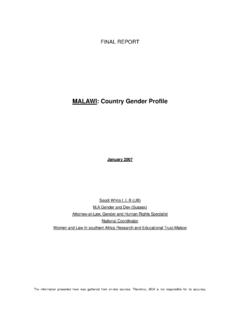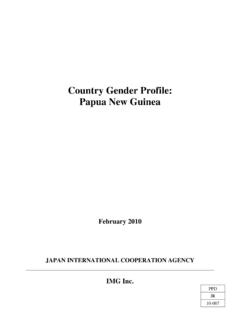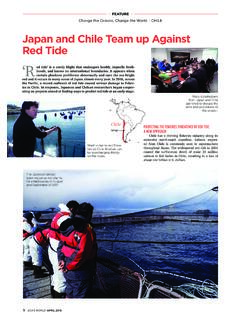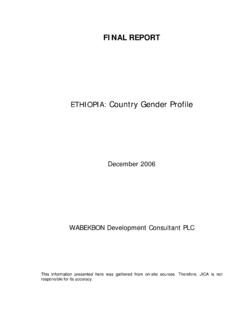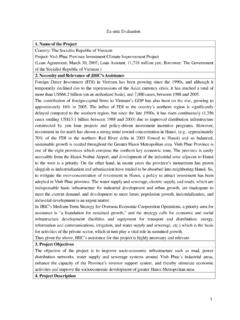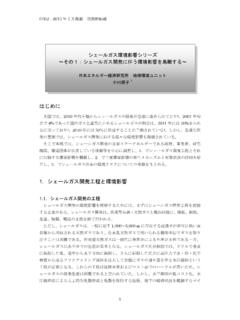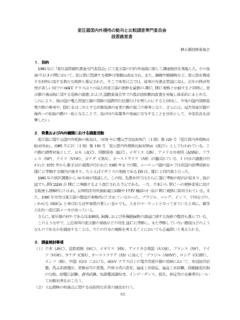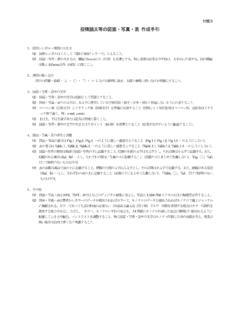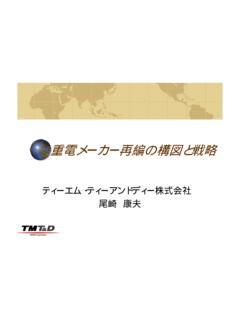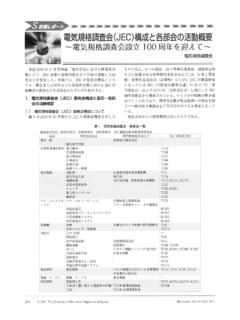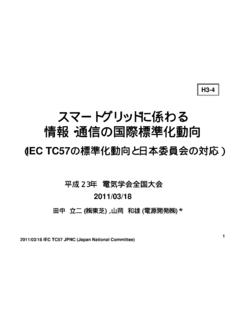Transcription of JAPAN INTERNATIONAL COOPERATION AGENCY …
1 JAPAN INTERNATIONAL COOPERATION AGENCY (JICA) GUIDELINES FOR environmental AND SOCIAL CONSIDERATIONS (Translation of Japanese Version) April 2010 CONTENTS Preface 1. Basic Matters Basic Principles Regarding environmental and Social Responsibility of Requirements of Project proponents Covered Measures Taken in an Advisory Committee of environmental and Social 2. Process of environmental and Social Considerations Information Impacts to be Consultation with Local Concern about Social Environment and Human Laws, Regulations and Standards of Advice of Advisory Committee for environmental and Social Decision-making by Ensuring Appropriate Implementation of and Compliance with the Implementation and Review of the 3.
2 Procedures of environmental and Social Considerations Preparatory Loan Aid, Grant Aid (excluding projects executed through INTERNATIONAL organizations) and Technical COOPERATION Preliminary Studies of Grant Aid undertaken by Technical COOPERATION for Development Appendix 1. environmental and Social Considerations Required for Intended Projects..28 Appendix 2. EIA Reports for Category A 2 Appendix 3. Illustrative List of Sensitive Sectors, Characteristics, and Appendix 4. Screening Appendix 5. Categories and Items in Appendix 6. Items Requiring 3 List of Acronyms EIA IEE JICA MOFA OECD TOR environmental Impact Assessment Initial environmental Examination JAPAN INTERNATIONAL COOPERATION AGENCY Ministry of Foreign Affairs Organization for Economic COOPERATION and Development Terms of Reference 4 Preface Owing to the recent increase of public interest in environmental issues, Principle 17 of the Rio Declaration on Environment and Development proclaims that an environmental impact assessment (EIA), as a national instrument, shall be undertaken for proposed activities that are likely to have a significantly adverse impact on the environment and that are subject to the decisions of a competent national authority.
3 Agenda 21 proposes that governments should promote the development at the national level of appropriate methodologies for making integrated energy, environment, and economic policy decisions for sustainable development, inter alia, through an EIA ( (b)). The Universal Declaration of Human Rights makes clear a common standard of achievement for all peoples and all nations: to promote respect for human rights and freedoms, and to secure their universal and effective recognition and observance. environmental and social considerations refer not only to the natural environment, but also to social issues such as involuntary resettlement and respect for the human rights of indigenous peoples. In 1985, the Organization for Economic COOPERATION and Development (OECD) Council Recommendation on the environmental Assessment of Development Assistance Projects and Programs was endorsed.
4 Since then, multilateral donors including the World Bank and main bilateral donors have prepared guidelines for environmental considerations and have applied them while implementing Official Development Assistance (ODA). Until now, the JBIC Guidelines for the Confirmation of environmental and Social Considerations (2002) and the JICA Guidelines for environmental and Social Considerations (2004) have been applied to Loan aid and technical COOPERATION , respectively. When the law concerning the independent administrative institution JAPAN INTERNATIONAL COOPERATION AGENCY (JICA) was revised in June 2006, JICA, an implementing AGENCY of the Japanese ODA, came to manage three forms of assistance technical COOPERATION , Loan aid, and Grant aid in an integrated fashion through a merger of the JICA and JBIC wings of the ODA after the effectuation of the law in October 2008.
5 Due to this situation, two sets of guidelines were integrated based on the characteristics of three schemes. JICA established a committee for revising its guidelines for environmental and social considerations. The members of this committee came from universities, non-governmental organizations (NGOs), the private sector, and related ministries, and meetings of the committee were open to the public. In addition to the discussions of the committee, the 5guidelines were prepared through public comments and consultation processes in order to ensure their transparency and accountability. JICA s Business Protocol and Mid-term Plan clearly state that JICA implements COOPERATION activities in accordance with the guidelines. JICA encourages host country governments, including local governments, borrowers, and project proponents, to implement the appropriate measures for environmental and social considerations when engaging in COOPERATION activities.
6 At the same time, JICA provides support for and examinations of environmental and social considerations in accordance with the guidelines. When encouraging the appropriate consideration of environmental and social aspects, it is JICA s policy to provide active support to projects that promote environmental conservation and to projects that contribute to the protection of the global environment, such as attempts to reduce greenhouse gas emissions. JICA also has a policy of being actively involved in supporting the enhancement of environmental and social considerations in developing countries. 61. Basic Matters Policy JAPAN s ODA Charter states that in formulating and implementing assistance policies, JAPAN will take steps to assure fairness. This will be achieved by giving consideration to the conditions of the socially vulnerable and to the gap between rich and poor, as well as the gaps among various regions in developing countries.
7 Furthermore, when implementing ODA, great attention will be paid to factors such as environmental and social impacts on developing countries. JICA, which is responsible for ODA, plays a key role in contributing to sustainable development in developing countries. The inclusion of environmental and social costs in development costs and the social and institutional framework that makes such inclusion possible are crucial for sustainable development. Internalization and an institutional framework are requirements for measures regarding environmental and social considerations, and JICA is required to have suitable consideration for environmental and social impacts. Democratic decision-making is indispensable for environmental and social considerations. It is important to ensure stakeholder participation, information transparency, accountability, and efficiency, in addition to respect for human rights, in order to conduct an appropriate decision-making process.
8 In this context, with respect to human rights and in view of the principles of democratic governance, the measures for environmental and social considerations are implemented by ensuring a wide range of meaningful stakeholder participation and transparency of decision-making, as well as by working for information disclosure and by ensuring efficiency. Governments bear the responsibility for accountability, but at the same time stakeholders are responsible for their comments. Owing to the issues discussed above, JICA always considers environmental and social impacts when implementing COOPERATION projects. Objectives The objectives of the guidelines are to encourage Project proponents etc. to have appropriate consideration for environmental and social impacts, as well as to ensure that JICA s support for and examination of environmental and social considerations are conducted accordingly.
9 The guidelines outline JICA s responsibilities and procedures, along with its requirements for project proponents etc., in order to facilitate the achievement of these objectives. In doing so, JICA endeavors to ensure 7transparency, predictability, and accountability in its support for and examination of environmental and social considerations. Definitions 1. environmental and social considerations means considering environmental impacts including air, water, soil, ecosystem, flora, and fauna, as well as social impacts including involuntary resettlement, respect for the human rights of indigenous people, and so on. 2. Project proponents etc. stands for host countries and host country governments, including local governments, borrowers, and project proponents. 3. COOPERATION projects include the following: (1) Loan aid, (2) Grant aid (excluding projects executed through INTERNATIONAL organizations), (3) Preliminary studies of grant aid undertaken by the Ministry of Foreign Affairs (MOFA), (4) Technical COOPERATION for development planning, and (5) Technical COOPERATION projects, undertaken by JICA.
10 4. Projects are undertakings that project proponents etc. conduct and that JICA supports. 5. environmental and social considerations studies include baseline surveys, predicting and evaluating the adverse impacts and likely impacts that projects may have on the environment and on local society, and mitigation measures to avoid and minimize these. 6. environmental impact assessment includes evaluating the environmental and social impacts that projects are to have, analyzing alternative plans, and preparing adequate mitigation measures and monitoring plans in accordance with the laws or guidelines of host countries. 7. A strategic environmental assessment is an assessment that is implemented at the policy, planning, and program levels, but not a project-level EIA. 8. Support for environmental and social considerations means offering project proponents etc.
